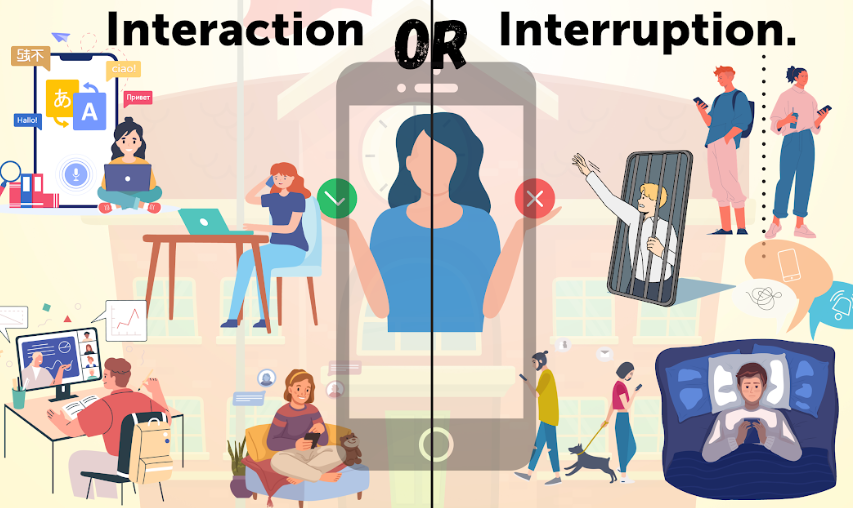Where is your phone right now? Maybe in your pocket or your hand. Have you ever felt ignored by your friend because of a phone? Or maybe you texted your friend on social media but never talked face-to-face? Do you think cell phones have changed people socially?
As we get older, cell phones become part of our lives. We are so dependent on our cell phones that we use them for everything, from checking time to searching for something on the internet. Besides their benefits, cell phones can lead to distraction during studies and can impact low grades. How do we manage this problem?
Interaction: Benefits of Cell phones.
Cell phones can be a great help for students because of their features and capabilities. Cell phones can provide access to a wide variety of apps and websites that can help students with their educational goals. For example, the device gives access to educational websites, quizzes, and videos. Additionally, phones can help students stay organized and connected to their teachers and peers.
Cell phones can be used to take pictures of notes and diagrams, scan documents, and access online resources. They also can be used to access calculators and other math-related tools, which can be helpful for students.
Cell phones can also serve as an emergency contact option for students, allowing them to quickly reach their parents in the event of an emergency. Furthermore, cell phones can also help students stay safe and secure by providing their location in case of an emergency.
For sophomore Adya Jha, having phones in school can be convenient. Despite that, it could lead to distraction.“I think [students] should have [cell phones] because they’re useful in schools, but they shouldn’t use them in class because it’s a distraction,” Jha said.
Interruptions: Disadvantages of Cell Phones.
In 2020, the National Center for Education Statistics reported that 77 percent of U.S. schools had moved to prohibit cell phones for nonacademic purposes. Disruptions for nonacademic purposes can lead to a decrease in student productivity, as well as an increase in student stress levels. It can also create a lack of focus on learning, as students may be distracted by their phones or using them to communicate with each other instead of paying attention to the teacher and lesson.
Additionally, phones can be a distraction for students, as well as a way to cheat on tests. They can also be a source of cyberbullying, with students using them to harass other students. This can lead to students becoming disconnected from their peers and causing them to socially change negatively.
Freshman Divitha Mathe believes that cell phones could be used in a distracting way. “One hundred percent of [phones can be a source of cyberbullying] because there’s more access to more social platforms,” Mathe said. “ It depends on what type of person you are, you might not post anything [on social media], but you also might post comments [on other people’s stuff] and be rude about it.”
Cell phones have also led students to rely more on texting than in-person communication. This has worsened their social and problem-solving skills and led to loneliness, isolation, poor communication skills, and missed opportunities for meaningful connections. As junior Vidhi Jariwala considers, phones can change people socially and be a barrier to relationships. “Yes, [cell phones had an impact on social life] because [people] don’t talk to [each other face to face], they just text from their phone,” Jariwala said.
What should we do?
Banning phones would be an incomprehensive solution. Instead, we should establish clear rules regarding phone usage and expect students to follow them. We need to focus on teaching students how to use their phones responsibly. This can be done through regular classroom discussions and by educating them about the potential risks of overusing their phones. Additionally, students should be encouraged to take a break from their phones and focus on their studies.
All in all, banning phones may not be the best solution, but setting rules and educating students on how to use their phones responsibly are important steps to prevent problems in the future from occurring — issues such as academic dishonesty, social isolation due to phone usage, and reduced focus levels in academics.


























![The Phoenix varsity volleyball team lines up for the national anthem. “We were more communicative [with each other] during this game, and I feel like we kept our energy up, especially after the first set,” senior Jessica Valdov said.](https://theblazerrhs.com/wp-content/uploads/2024/10/DSC_0202-1200x800.jpg)










![Junior Alex Alkhal pitches the ball. “[I] just let it go and keep practicing so we can focus on our goal for the next game to get better as a team,” Alkhal said.](https://theblazerrhs.com/wp-content/uploads/2025/05/DSC_0013-1-1200x929.jpg)




















